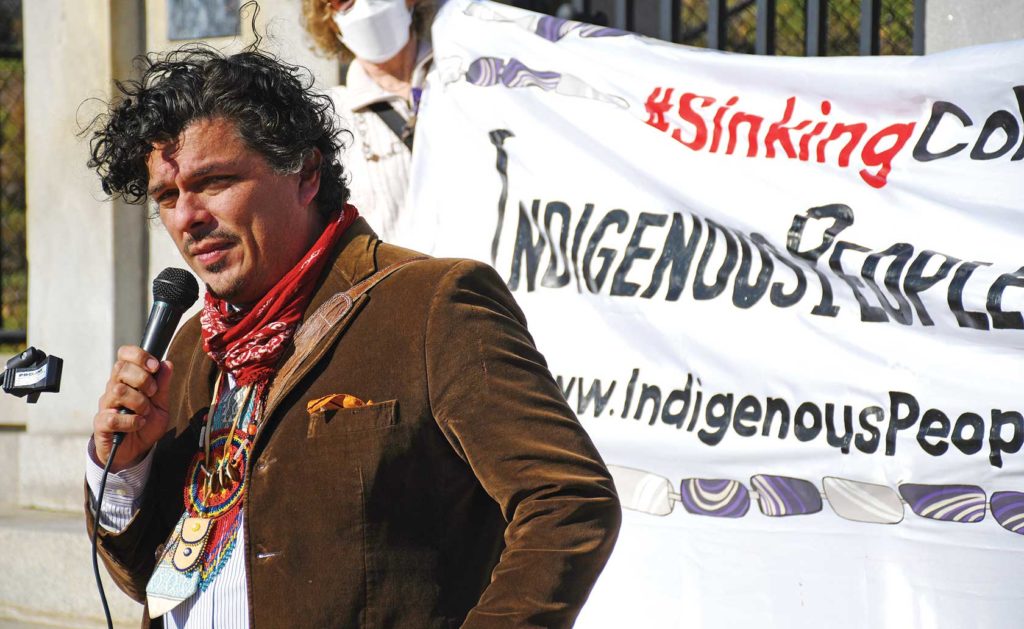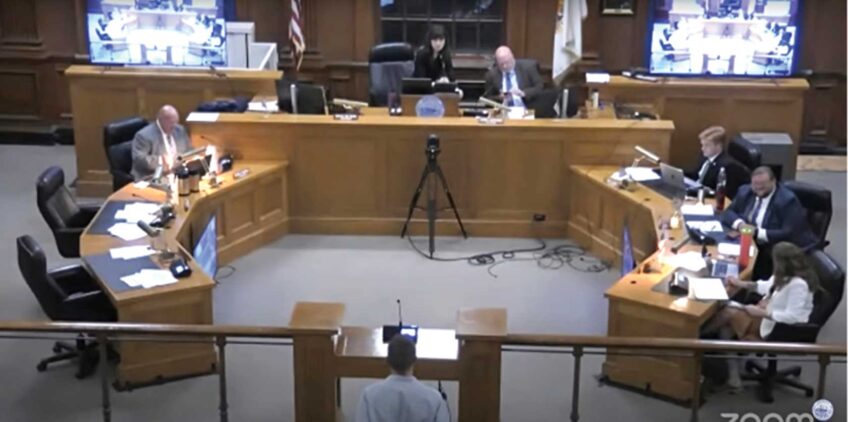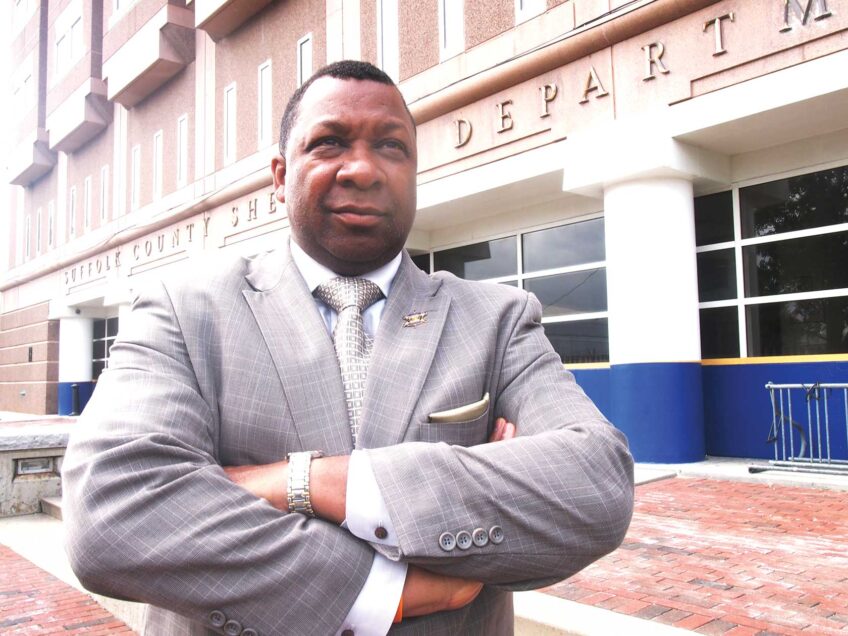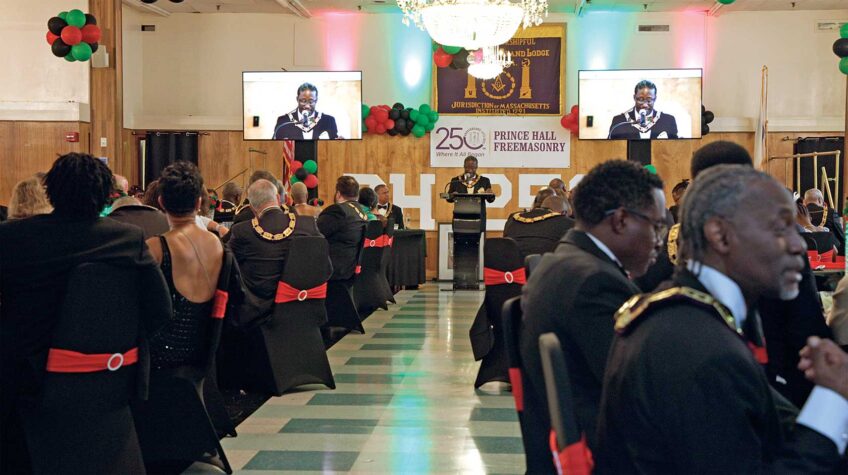A Native American legislative agenda
School mascots, state flag are in crosshairs as activists push bills

Native American advocates and supporters gathered with state legislators on the State House steps Nov. 18 to voice support for five bills that would address the treatment and experience of Native Americans across the state.
The five bills, collectively known as the Massachusetts Indigenous Legislative Agenda, would tackle a range of issues such as establishing Indigenous Peoples Day to replace Columbus Day; prohibiting the use of Native American team names, mascots and logos in Massachusetts public schools; and amending school curriculums to teach about the history and current issues of tribes within the state and across the country. The bills would also create a permanent, independent commission to work on improving educational outcomes and opportunities for indigenous students in the state and would expand the federal Native American Graves Protection and Repatriation Act to extend to Massachusetts agencies, taking a step to return cultural items and human remains to their respective tribes.
At the Nov. 18 press conference, Mahtowin Munro, co-leader of United American Indians of New England, said she supports the curriculum bill not only as someone who is Lakota, but also as a mother of children in Massachusetts public schools.
“As somebody who watched my kids having to deal with a curriculum year after year that completely excluded indigenous people, feeling like they did not exist historically, within their schools, they did not exist within the curriculum,” Munro said. “Going to school with students who knew nothing about them, being asked if they were extinct, or if we were still here. My children are actually enrolled as Aquinnah Wampanoag people, they’re from right here in the state, and they shouldn’t have had to deal with that. None of our indigenous children should have to deal with that.”
State Senator Rebecca Rausch, who was lead sponsor of the curriculum bill in the senate, also described the impact it would have on her children, who are not Native American. She said education should include both windows into others’ experiences and mirrors for students to see their own culture.
“For our mirrors, we must accommodate the vital need for Indigenous students in Massachusetts to see their own culture accurately and positively depicted,” Rausch said. “Our school children rarely learn about the Native American history of our region nor about the contemporary people who live here, including the Massachusett, Nipmuc, Aquinnah Wampanoag, Mashpee Wampanoag and other bands of the Wampanoag, as well as native people in Massachusetts enrolled in tribal nations throughout the United States and Canada.”
Faries Gray, sagamore of the Massachusett Tribe at Ponkapoag, said the fight to get rid of mascots representing Native Americans is ongoing. He described meeting with the mayor of Braintree to get rid of their mascot “the Wamp,” named after Wompatuck, a Mattakeesett tribal leader from the 1600s. Gray said the meeting which led to the removal of the imagery while leaving the name.
Matthew Lynch, who was elected to the Braintree School Committee this month, ran on a platform that included bringing the imagery back. Lynch previously worked as a teacher in the district until he resigned when photos surfaced of him at the Jan. 6 riots at the U.S. Capitol.
“Even when we kind of get rid of it, we still have a push to bring that mascot back, and so we really need everyone to help, all of us, to get legislation passed to get rid of the mascot,” Gray said at the press conference.
In a press release, Gray was quoted saying that the use of imagery or names in mascots doesn’t feel positive to him.
“We don’t feel like we are being honored by any mascots,” Gray said in the release. “We feel like a trophy. ‘We conquered you and this is our trophy.’ It’s insane we have to deal with it. We’re still here. We’re a living people.”
According to a 2020 paper published in Race, Ethnicity and Education, researchers found Native American mascots led to lower self-esteem and feelings of stress and depression in Native American students. The same paper found the use of Native American mascots might lead non-native people to be more likely to associate negative stereotypes and prejudice toward Native Americans.
For supporters, it’s important that these bills move quickly through the legislature. Munro referenced a bill passed in January that set up a commission to change the state flag and seal, which depicts a Native American man and a hand holding a sword above him.
“It took 36 years to get the Flag and Seal Bill passed; we are not going to wait 36 years to get this other legislation passed,” Munro said.
She also said that the Indigenous Legislative Agenda is only a starting point, and that more work is needed, even if all five bills get passed.
“Somebody was referring to this legislation as an Indigenous bill of rights, or something like that; this is not,” Munro said. “We need much more than that. Frankly, these bills are only a very basic beginning of getting some respect in the Commonwealth of Massachusetts, and that’s why we need everybody’s help for this.”
Representative Nika Elugardo called the press conference and the lobby day being held with legislators the same day “just the beginning.”
“The work you’re doing today begins here, but it ends when we remove that flag and replace it with another one, when we remove the curriculum and replace it with another one,” Elugardo said. “And as Mahtowin [Munro] said, this is just such a tiny, miniscule part of what needs to be done, because what we’re really trying to do is we’re really trying to call out the disrespect and the persecution of the most important cultural group to the foundation of this nation.”
Jean-Luc Pierite, president of the North American Indian Center of Boston, said the bills are important for another reason too. He hopes they can lay the groundwork for better Native American representation in the state legislature. Currently there are no Native American legislators in the State House.
“We need to send someone from our communities to the State House so that we have someone who can advocate for our issues,” Pierite said “But we need these changes in order to get to that greater point in which there is trust in the social systems, trust in civic engagement, trust that the system — as biased as is it, as set up against us as it is — [in] some way it can work.”






